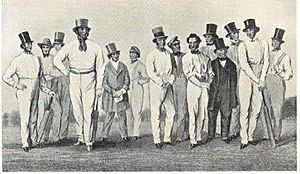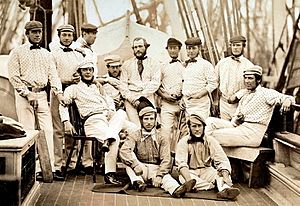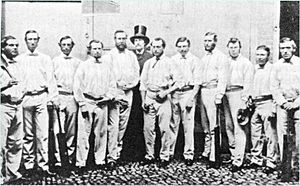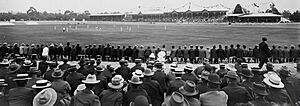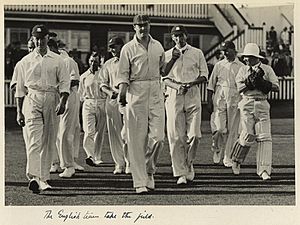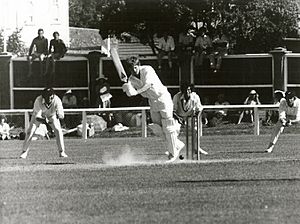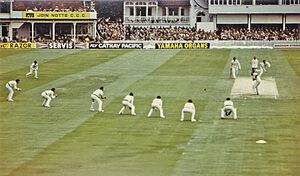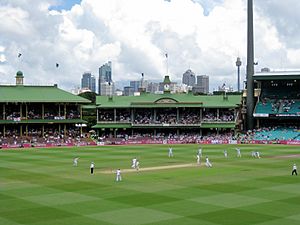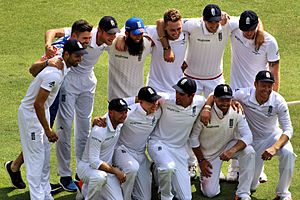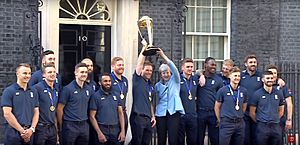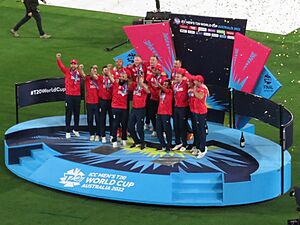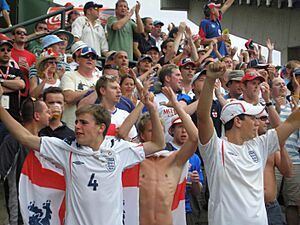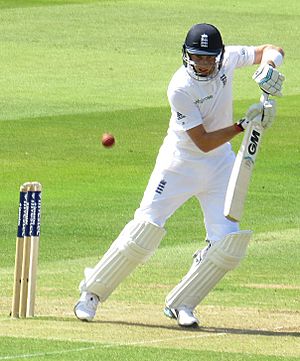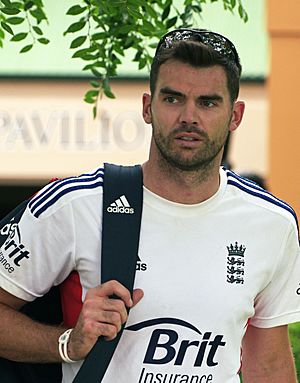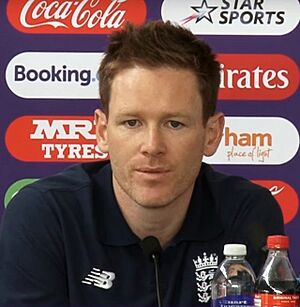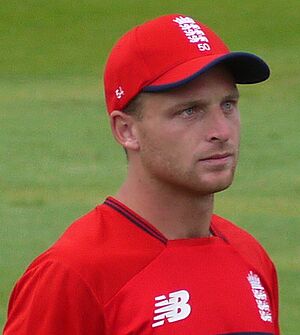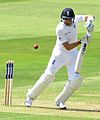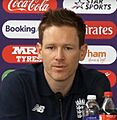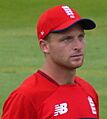England cricket team facts for kids
 |
|||||||||||||
| Association | England and Wales Cricket Board | ||||||||||||
|---|---|---|---|---|---|---|---|---|---|---|---|---|---|
| Personnel | |||||||||||||
| Test captain | Ben Stokes | ||||||||||||
| One Day captain | Harry Brook | ||||||||||||
| T20I captain | Harry Brook | ||||||||||||
| Coach | Brendon McCullum | ||||||||||||
| History | |||||||||||||
| Test status acquired | 1877 | ||||||||||||
| International Cricket Council | |||||||||||||
| ICC status | Full Membership (1909) | ||||||||||||
| ICC region | Europe | ||||||||||||
|
|||||||||||||
| Tests | |||||||||||||
| First Test | v. |
||||||||||||
| Last Test | v. |
||||||||||||
|
|||||||||||||
| World Test Championship appearances | 3 (first in 2021) | ||||||||||||
| Best result | Fourth place (2021, 2023) | ||||||||||||
| One Day Internationals | |||||||||||||
| First ODI | v. |
||||||||||||
| Last ODI | v. |
||||||||||||
|
|||||||||||||
| World Cup appearances | 13 (first in 1975) | ||||||||||||
| Best result | Champions (2019) | ||||||||||||
| Twenty20 Internationals | |||||||||||||
| First T20I | v. |
||||||||||||
| Last T20I | v. |
||||||||||||
|
|||||||||||||
| T20 World Cup appearances | 8 (first in 2007) | ||||||||||||
| Best result | Champions (2010, 2022) | ||||||||||||
|
|||||||||||||
| As of 14 July 2025 | |||||||||||||
The England men's cricket team plays for England and Wales in international cricket matches. Since 1997, the England and Wales Cricket Board (ECB) has managed the team. Before that, the Marylebone Cricket Club (MCC) was in charge from 1903. England and Wales are founding members of the International Cricket Council (ICC). This means they can play in all three main types of international cricket: Test matches, One Day International (ODI) matches, and Twenty20 International (T20I) matches.
England and Australia played the very first Test match in March 1877. They also played the first ODI in January 1971. England's first T20I was against Australia in June 2005.
As of July 2025, England has played 1,087 Test matches, winning 403 and losing 329. They play for The Ashes trophy against Australia, which is one of the most famous trophies in sports. England has won The Ashes 32 times. The team has also played 814 ODIs, winning 406. They reached the Cricket World Cup final four times, winning their first title in 2019. England has played 207 T20Is, winning 108. They won the ICC T20 World Cup in 2010 and 2022.
The ICC currently ranks England third in Tests, eighth in ODIs, and third in T20Is.
Contents
- Team History
- Early Tours and First Test Match
- The Ashes Begin (1880s)
- Early 1900s Challenges
- Before World War I (1910s)
- After World War I (1920s)
- The Bodyline Series (1930s)
- Post-War Cricket (1940s-1950s)
- Challenges and Success (1960s-1970s)
- Ups and Downs (1980s)
- New Era and World Cup Success (1990s-2010s)
- Recent Years (2020s)
- Recent Match Results
- Upcoming Matches
- Who Manages the Team?
- Cricket Grounds in England and Wales
- Current Team Players
- Coaching Staff
- Team Uniforms
- Fan Support
- Tournament History
- Team Achievements
- Team Records
- England Men's Cricketer of the Year
- Player Eligibility Rules
- Images for kids
- See also
Team History
The first time a team claimed to represent "All-England" was on July 9, 1739. This team played against Kent. Such matches happened many times for almost a century.
In 1846, William Clarke created the All-England Eleven. This team often played against a United All-England Eleven. These games were very important in English cricket from 1847 to 1856.
Early Tours and First Test Match
The first time an English team toured another country was in September 1859. They visited North America. This team included players from both the All-England Eleven and the United All-England Eleven. George Parr was their captain.
When the American Civil War started, cricket tours looked elsewhere. English teams visited Australia in 1861–62. These early tours were often "against odds," meaning the opposing team had more than 11 players to make the game fairer.
The first Australian tour was so successful that Parr led a second tour in 1863–64. Later, James Lillywhite led an England team that played a combined Australian XI in March 1877. This match, played in Melbourne, is now known as the first-ever Test match. Australia won by 45 runs. Charles Bannerman of Australia scored the first Test century.
Lillywhite's team won the return match by four wickets. The first Test match played in England was in 1880, which England won. This was the first time England had a fully representative team, including W. G. Grace.
The Ashes Begin (1880s)
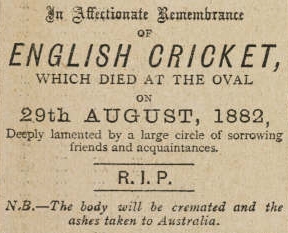
England lost their first home series 1–0 in 1882. After this loss, a newspaper called The Sporting Times printed a funny "obituary" for English cricket. It said English cricket had "died" and its "ashes" would be taken to Australia.
Because of this, the tour of 1882–83 was called "the quest to regain the ashes" by England's captain, Ivo Bligh. England won the series 2–1. Bligh was given a small urn said to contain ashes, and that's how The Ashes trophy got its name. England was very strong in these early years, winning The Ashes 10 times between 1884 and 1898. During this time, England also played their first Test match against South Africa in 1889.
Early 1900s Challenges
The early 1900s brought mixed results for England. They lost four of the eight Ashes series between 1900 and 1914. They also lost their first series against South Africa in 1905–06.
England lost to Australia in the 1901–02 Ashes and again in 1902. However, England won back The Ashes in 1904 under Pelham Warner's captaincy. In 1905–06, they lost badly to South Africa, but got revenge in 1907. They lost the 1909 Ashes series to Australia.
Before World War I (1910s)
England toured Australia in 1911–12 and won the series 4–1. This team included famous players like Wilfred Rhodes, Jack Hobbs, and Frank Woolley. This was the last Ashes series before World War I.
In 1912, a special tournament was held with England, South Africa, and Australia. It was called a "triangular tournament" and had nine Test matches. However, bad weather and player disagreements made it a failure. England won most of their matches because Australia sent a weaker team. King George V watched a match at Lord's, which was the first time a king had watched Test cricket.
After World War I (1920s)
England's first match after World War I was in 1920–21 against Australia. England lost all five matches in a "whitewash." They continued to struggle in the next few Ashes series.
However, England's luck changed in 1926 when they won back The Ashes. They became a very strong team, beating Australia 4–1 in the 1928–29 Ashes tour.
In the same year, the West Indies became the fourth country to get Test status. England won all three of their first matches against the West Indies easily. In 1929–30, England sent two different teams on tour at the same time. One went to New Zealand and the other to the West Indies. England won against New Zealand and drew with the West Indies.
The Bodyline Series (1930s)
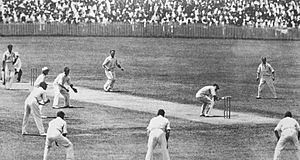
The 1930 Ashes series was dominated by a young Australian player named Don Bradman. He scored an amazing 974 runs in seven innings. Because Bradman scored so many runs, England's captain, Douglas Jardine, developed a new tactic called "bodyline." This involved bowling fast balls directly at the batsman's body. The idea was to make the batsman defend himself, hoping he would hit the ball up for a catch.
Using bodyline, England won the next Ashes series 4–1. But this tactic caused a lot of anger and even diplomatic problems between Australia and England. The Australian Cricket Board complained that it was "unsportsmanlike."
After this, Jardine was removed as captain. Cricket rules were changed to limit how many fast balls could be aimed at the body and how many fielders could be placed on the leg side.
England's tour of India in 1933–34 was the first Test match played in India. The 1934 Ashes series was won by Australia, who then held the urn for the next 19 years.
England drew the 1938 Ashes series, so Australia kept the urn. In the final match, England won by a huge margin. Len Hutton scored 364 runs, the highest ever by an Englishman in a Test match.
Post-War Cricket (1940s-1950s)
Test cricket started again after World War II in 1946. England won their first match against India. However, they struggled in the 1946–47 Ashes series, losing 3–0 in Australia. England beat South Africa 3–0 in 1947.
England had more tough times against the West Indies in 1947–48 and against Bradman's strong Australian team in the 1948 Ashes. In 1948–49, England beat South Africa 2–0. The 1940s ended with England drawing all their Test matches against New Zealand.
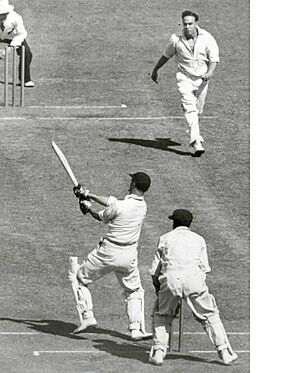
In 1950, England lost to the West Indies for the first time. But their luck against Australia changed in the 1953 Ashes tour when they won 1–0. England did not lose a series between 1950–51 and 1958–59. They had a famous win in 1954–55 under Len Hutton's captaincy, thanks to Frank Tyson's fast bowling. The 1956 series is remembered for Jim Laker taking 19 wickets in one match.
In 1958–59, England toured Australia with a very strong team but lost the series 4–0. In 1959, England beat India 5–0 in a "whitewash."
Challenges and Success (1960s-1970s)
The early 1960s were difficult for English cricket. Australia held The Ashes, and the West Indies were very strong. England's captains changed often.
However, from 1968 to 1971, England played 27 Test matches without losing. They won 9 and drew 18. During this time, they beat New Zealand, India, the West Indies, and Pakistan. Under Ray Illingworth's leadership, they won back The Ashes from Australia in 1970–71.
In the early 1970s, Illingworth's team was dominant. They won The Ashes away in 1971 and kept them at home in 1972. This team was very strong, with players like Geoffrey Boycott, John Edrich, and Dennis Amiss.
The mid-1970s were more difficult. England lost to a strong West Indies side. Mike Denness became captain but only lasted 18 months. Tony Greig took over in 1975. He was later replaced by Mike Brearley.
Brearley's team from 1977–80 included future stars like Ian Botham, David Gower, and Graham Gooch. They beat a weakened Australian team 5–1 in 1978–79.
Ups and Downs (1980s)
The 1980s were a tough time for the England team. Even with great players like Botham, Gooch, and Gower, the team often struggled against strong opponents.
Botham became captain in 1980. After losing the captaincy due to poor form, he played incredibly well in the 1981 Ashes series. This series became known as "Botham's Ashes" as England won 3–1.
Keith Fletcher and Bob Willis also captained the team. England won the 1985 Ashes 3–1 under Gower. In 1986, Micky Stewart became England's first full-time coach. Despite being called a team that "can't bat, can't bowl and can't field," England won The Ashes in 1986–87.
England reached the final of the 1987 World Cup but lost to Australia. They then lost The Ashes to Australia again.
New Era and World Cup Success (1990s-2010s)
The 1990s saw some improvements. Graham Gooch became captain in 1990 and pushed for more professionalism. England did well against India and New Zealand in 1990. They also reached the final of the 1992 Cricket World Cup, finishing as runners-up. However, their bowling struggled against Australia and Pakistan.
Michael Atherton took over as captain in 1993. England continued to do well at home against weaker teams but struggled against stronger ones like Pakistan and South Africa. Alec Stewart became captain in 1998. By 1999, England was ranked as the lowest Test nation.
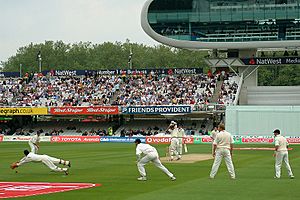
New "central contracts" were introduced, which helped players manage their workload. With coach Duncan Fletcher, England improved greatly. They beat the West Indies and won series in Pakistan and Sri Lanka. By 2005, England was ranked second in Test cricket.
In June 2005, England played their first-ever T20 international match, beating Australia. Later that year, England defeated Australia 2–1 in an exciting series to win back The Ashes for the first time in 16 years.
After losing The Ashes 5–0 in 2006–07, Peter Moores became coach. Kevin Pietersen became captain in 2008, but both he and Moores resigned due to disagreements. Andrew Strauss took over as captain.
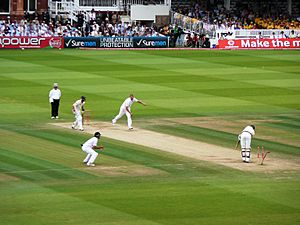
In the 2009 Ashes series, England drew the first Test thanks to a last-wicket stand. England won the series and regained The Ashes.
After a drawn series in South Africa, England won their first-ever ICC event, the 2010 ICC World Twenty20. In the 2010–11 Ashes series, they beat Australia 3–1, their first series win in Australia in 24 years.
In August 2011, England became the world's top-ranked Test team after beating India 4–0. However, they lost this top spot a year later. Alastair Cook became captain and led England to a 2–1 victory in India, their first there since 1984–85.
England won the 2013 Ashes series at home 3–0. But in the return series in Australia, they lost 5–0. Coach Fletcher resigned, and Pietersen was dropped from the team. Moores returned as coach but was sacked again after poor results, including an early exit from the 2015 Cricket World Cup.
Australian Trevor Bayliss became coach and helped the ODI team improve. England won back The Ashes 3–2 in 2015. However, the Test team's performance declined. Joe Root became captain in 2017.
England was a favorite for the 2019 Cricket World Cup. After some tough matches, they reached the semi-finals and then the final. The final against New Zealand was incredibly exciting, ending in a tie even after a "Super Over." England won because they had scored more boundaries in the match. This was their first World Cup title!
The 2019 Ashes series was also very memorable. Ben Stokes played an amazing innings to help England win one Test, keeping the series alive. England drew the series 2–2.
Recent Years (2020s)
Under new coach Chris Silverwood, England started the 2020s well, beating South Africa 3–1 away from home. The COVID-19 pandemic affected cricket, but England managed to play most of their scheduled matches.
The 2021–22 Ashes series was very tough for England, as they lost 4–0. Silverwood resigned, and Ashley Giles also left his role. England then toured the West Indies and lost the series. Root resigned as captain.
In 2022, Ben Stokes became the new Test captain, and Brendon McCullum became coach. Their attacking style of play became known as "Bazball." The Test team won 11 of their first 13 matches. The white-ball team also got a new coach, Matthew Mott, and set a record for the highest total in One Day cricket, scoring 498–4 against the Netherlands.
Jos Buttler became the white-ball captain and led England to win the 2022 ICC Men's T20 World Cup. This made England the first team to hold both the 50-over and 20-over World Cup trophies at the same time. In 2023, England drew The Ashes series but had a disappointing performance in the 2023 Cricket World Cup, exiting in the group stage.
Recent Match Results
| Home | Away | |||||
| Test | One Day International | Twenty20 International | Test | One Day International | Twenty20 International | |
|---|---|---|---|---|---|---|
| Last match won | Only Test v Zimbabwe 2025 | 3rd ODI v West Indies 2025 | 2nd T20I v Australia 2024 | 2nd Test v New Zealand 2024 | 2nd ODI v West Indies 2024 | 3rd T20I v West Indies 2024 |
| Last match lost | 3rd Test v Sri Lanka 2024 | 5th ODI v Australia 2024 | 1st T20I v Australia 2024 | 3rd Test v New Zealand 2024 | Group match v South Africa 2025 | 5th T20I v India 2025 |
| Last series won | Sri Lanka 2024 | West Indies 2025 | Pakistan 2024 | New Zealand 2024–25 | Bangladesh 2022–23 | West Indies 2024–25 |
| Last series lost | New Zealand 2021 | Australia 2024 | South Africa 2022 | India 2023–24 | 2025 Champions Trophy | India 2024–25 |
| – | Source: ESPNcricinfo.com. Last updated: 5 June 2025. | Source: ESPNcricinfo.com. Last updated: 5 June 2025. | Source: ESPNcricinfo.com. Last updated: 15 September 2024. | Source: ESPNcricinfo.com. Last updated: 5 June 2025. | Source: ESPNcricinfo.com. Last updated: 5 June 2025. | Source: ESPNcricinfo.com. Last updated: 5 June 2025. |
Upcoming Matches
Here are England's international cricket matches planned until Spring 2026:
Summer 2025
- June to August: Indian cricket team in England in 2025 for five Tests
- September: South African cricket team in England in 2025 for three ODIs and three T20Is
- September: English cricket team in Ireland in 2025 for three ODIs
Winter 2025–26
- October to November: English cricket team in New Zealand in 2025–26 for three ODIs and three T20Is
- November to January: 2025–26 Ashes series, five Tests against Australia
- January to February: English cricket team in Sri Lanka in 2025–26 for three ODIs and three T20Is
- February to March: 2026 Men's T20 World Cup
Who Manages the Team?
The England and Wales Cricket Board (ECB) is the main group that runs cricket in England and Wales, including the England team. It started on January 1, 1997. The ECB also handles money from ticket sales, sponsorships, and TV rights for the England team.
Before 1997, the Test and County Cricket Board (TCCB) was in charge. For tours abroad, the England team used to officially play as the MCC. This showed that the MCC was responsible for choosing the touring players.
Wales and the England Team
Historically, the England team represented all of Great Britain. Players from Scotland and Wales sometimes played for England. Scotland became its own ICC member in 1994.
Some people think Wales should have its own independent cricket team. This is because Welsh players, like Simon and Geraint Jones, play for England. They believe Wales should be an independent member of the ICC, just like Ireland.
However, both Cricket Wales and Glamorgan County Cricket Club support the ECB. They say being part of the English and Welsh structure helps them financially.
The idea of a Welsh cricket team has been discussed in the Welsh Senedd. In 2013, politicians supported the idea of an independent Welsh team. In 2015, a report showed strong feelings about this. Bethan Jenkins argued that Wales should have its own team and leave the ECB. She pointed out that Ireland, with fewer club players, is an ICC member.
In 2017, the First Minister of Wales, Carwyn Jones, also called for the Welsh one-day team to be brought back.
Cricket Grounds in England and Wales
Here are the main cricket grounds in England and Wales where international matches are played. They are listed by when they first started hosting games.
| Venue | City | County team | Capacity | Years used | Test | ODI | T20I |
|---|---|---|---|---|---|---|---|
| Current venues | |||||||
| The Oval | London | Surrey | 26,000 | 1880– | 102 | 74 | 16 |
| Old Trafford | Manchester | Lancashire | 26,000 | 1884– | 82 | 55 | 10 |
| Lord's | London | Middlesex | 28,000 | 1884– | 140 | 67 | 10 |
| Trent Bridge | Nottingham | Nottinghamshire | 17,500 | 1899– | 63 | 49 | 12 |
| Headingley | Leeds | Yorkshire | 17,500 | 1899– | 78 | 45 | 1 |
| Edgbaston | Birmingham | Warwickshire | 25,000 | 1902– | 53 | 64 | 5 |
| Riverside Ground | Chester-le-Street | Durham | 19,000 | 1999– | 6 | 20 | 3 |
| Sophia Gardens | Cardiff | Glamorgan | 15,500 | 1999– | 3 | 29 | 8 |
| Rose Bowl | Southampton | Hampshire | 25,000 | 2003– | 7 | 31 | 9 |
| County Ground | Taunton | Somerset | 12,500 | 1983– | – | 6 | 1 |
| County Ground | Bristol | Gloucestershire | 17,500 | 1983– | – | 19 | 3 |
| Former venues | |||||||
| Bramall Lane | Sheffield | Yorkshire | 32,000 | 1902 | 1 | – | — |
| St. Helen's | Swansea | Glamorgan | 4,500 | 1973–1983 | – | 2 | — |
| North Marine Road Ground | Scarborough | Yorkshire | 11,500 | 1976–1978 | – | 2 | — |
| Grace Road | Leicester | Leicestershire | 12,000 | 1983–1999 | – | 3 | — |
| New Road | Worcester | Worcestershire | 5,500 | 1983–1999 | – | 3 | — |
| County Ground | Southampton | Hampshire | 7,000 | 1983–1999 | – | 3 | — |
| County Ground | Derby | Derbyshire | 9,500 | 1983–1999 | – | 2 | — |
| Nevill Ground | Tunbridge Wells | Kent | 6,000 | 1983 | – | 1 | — |
| County Ground | Chelmsford | Essex | 6,500 | 1983–1999 | – | 3 | — |
| St Lawrence Ground | Canterbury | Kent | 15,000 | 1999–2005 | – | 4 | — |
| County Ground | Northampton | Northamptonshire | 6,500 | 1999 | – | 2 | — |
| As of 18 July 2021 | |||||||
Current Team Players
This list shows players who have contracts or have played for England in the last year (since July 13, 2024). It also includes players (in italics) who were recently chosen for the team.
The ECB gives contracts to players each October. These contracts cover both Test (red-ball) and limited-overs (white-ball) cricket. They consider how likely players are to play for England and how well they performed in the past year. Some contracts are for multiple years since 2023.
Key
- S/N = Shirt number
- Con = Contract type (Central / Development)
| Name | Age | Batting style | Bowling style | Domestic team | Con | Forms | S/N | Captaincy | Last Test | Last ODI | Last T20I |
|---|---|---|---|---|---|---|---|---|---|---|---|
| Batters | |||||||||||
| Jonny Bairstow | 36 | Right-handed | – | Yorkshire | C | – | 51 | ||||
| Tom Banton | 27 | Right-handed | – | Somerset | – | ODI, T20I | 98 | – | |||
| Harry Brook | 26 | Right-handed | Right-arm medium | Yorkshire | C | Test, ODI, T20I | 88 | ODI, T20I (C) | |||
| Jordan Cox | 25 | Right-handed | – | Essex | – | ODI, T20I | 93 | – | |||
| Zak Crawley | 27 | Right-handed | – | Kent | C | Test | 6 | – | |||
| Ben Duckett | 31 | Left-handed | – | Nottinghamshire | C | Test, ODI, T20I | 17 | ||||
| Dan Lawrence | 28 | Right-handed | Right-arm off break | Surrey | – | Test | 68 | – | – | ||
| Joe Root | 34 | Right-handed | Right-arm off break/leg spin | Yorkshire | C | Test, ODI | 66 | ||||
| All-rounders | |||||||||||
| Rehan Ahmed | 21 | Right-handed | Right-arm leg spin | Leicestershire | C | Test, T20I | 53 | ||||
| Jacob Bethell | 22 | Left-handed | Slow left-arm orthodox | Warwickshire | C | Test, ODI, T20I | 82 | ||||
| Brydon Carse | 30 | Right-handed | Right-arm fast | Durham | C | Test, ODI, T20I | 92 | ||||
| Sam Curran | 27 | Left-handed | Left-arm medium-fast | Surrey | C | ODI, T20I | 58 | ||||
| Liam Dawson | 35 | Right-handed | Slow left-arm orthodox | Hampshire | – | Test, T20I | 83 | ||||
| Will Jacks | 27 | Right-handed | Right-arm off break | Surrey | C | ODI, T20I | 85 | ||||
| Liam Livingstone | 32 | Right-handed | Right-arm leg spin/off break | Lancashire | C | ODI, T20I | 23 | ||||
| Dan Mousley | 24 | Left-handed | Right-arm off break | Warwickshire | – | ODI, T20I | 96 | – | |||
| Jamie Overton | 31 | Right-handed | Right-arm fast | Surrey | – | ODI, T20I | 75 | ||||
| Ben Stokes | 34 | Left-handed | Right-arm fast-medium | Durham | C | Test | 55 | Test (C) | |||
| Chris Woakes | 36 | Right-handed | Right-arm fast-medium | Warwickshire | C | Test | 19 | ||||
| Wicket-keeper-batters | |||||||||||
| Jos Buttler | 35 | Right-handed | – | Lancashire | C | ODI, T20I | 63 | ||||
| Ollie Pope | 27 | Right-handed | – | Surrey | C | Test | 80 | Test (VC) | – | – | |
| Phil Salt | 29 | Right-handed | – | Lancashire | C | ODI, T20I | 61 | – | |||
| Jamie Smith | 25 | Right-handed | – | Surrey | C | Test, ODI, T20I | 39 | ||||
| Pace bowlers | |||||||||||
| Jofra Archer | 30 | Right-handed | Right-arm fast | Sussex | C | Test, ODI, T20I | 22 | ||||
| Gus Atkinson | 27 | Right-handed | Right-arm fast-medium | Surrey | C | Test, ODI, T20I | 37 | ||||
| Sonny Baker | 22 | Right-handed | Right-arm fast | Hampshire | D | – | 60 | – | – | – | |
| Sam Cook | 28 | Right-handed | Right-arm fast-medium | Essex | – | Test | 86 | – | – | ||
| Josh Hull | 21 | Left-handed | Left-arm fast-medium | Leicestershire | D | Test | 47 | – | – | ||
| Saqib Mahmood | 28 | Right-handed | Right-arm fast-medium | Lancashire | – | ODI, T20I | 25 | ||||
| Matthew Potts | 27 | Right-handed | Right-arm fast-medium | Durham | C | Test, ODI, T20I | 35 | ||||
| Olly Stone | 32 | Right-handed | Right-arm fast | Nottinghamshire | C | Test, ODI | 26 | ||||
| Josh Tongue | 28 | Right-handed | Right-arm fast-medium | Nottinghamshire | C | Test | 56 | – | – | ||
| Reece Topley | 31 | Right-handed | Left-arm fast-medium | Surrey | C | ODI, T20I | 38 | – | |||
| John Turner | 24 | Right-handed | Right-arm fast-medium | Hampshire | D | ODI, T20I | 41 | – | |||
| Luke Wood | 30 | Left-handed | Left-arm medium-fast | Lancashire | – | ODI, T20I | 77 | – | |||
| Mark Wood | 35 | Right-handed | Right-arm fast | Durham | C | Test, ODI, T20I | 33 | ||||
| Spin bowlers | |||||||||||
| Shoaib Bashir | 22 | Right-handed | Right-arm off break | Somerset | C | Test | 67 | – | – | ||
| Tom Hartley | 26 | Left-handed | Slow left-arm orthodox | Lancashire | – | ODI | 79 | – | |||
| Jack Leach | 34 | Left-handed | Slow left-arm orthodox | Somerset | C | Test | 77 | – | – | ||
| Adil Rashid | 37 | Right-handed | Right-arm leg spin | Yorkshire | C | ODI, T20I | 95 | ||||
Coaching Staff
| Position | Name |
|---|---|
| Head coach | Brendon McCullum |
| Assistant coach | Paul Collingwood |
| Batting coach | Marcus Trescothick |
| Fast-bowling consultant | James Anderson |
| Spin bowling coach | Jeetan Patel |
| Lions coach | Andrew Flintoff |
| Fast-bowling coach | Neil Killeen |
Team Uniforms
| Period | Kit manufacturer | Shirt sponsor |
|---|---|---|
| 1994–1996 | Tetley Bitter | |
| 1996–1998 | ASICS | |
| 1998–2000 | Vodafone | |
| 2000–2008 | Admiral | |
| 2008–2010 | Adidas | |
| 2010–2014 | Brit Insurance | |
| 2014–2017 | Waitrose | |
| 2017–2021 | New Balance | NatWest |
| 2021–2022 | Cinch | |
| 2022–2025 | Castore | |
| 2025–present | Toyota |
When playing Test cricket, England's white uniforms have the three lions badge on the left side of the shirt. The sponsor's name, Toyota, is in the middle. Players can wear a navy blue cap or a white sun hat with the ECB logo. Helmets are also navy blue.
In One Day Internationals, the team wears a blue shirt with navy trousers. For Twenty20 matches, the kit is a flame-red shirt and navy trousers. England's ODI kit colors have changed over the years, usually staying in shades of blue, but sometimes being all red.
In limited-overs cricket, England's shirts feature the Toyota logo. However, in ICC tournaments, a special kit is used with "ENGLAND" printed on the front and the sponsor's logo on the sleeve.
Fan Support
The Barmy Army is a group of passionate fans who follow the English cricket team. They often travel to matches both in the UK and overseas. What started as an informal group is now a company.
The name "Barmy Army" is also used for any fans who join in the chants and support at matches. The word "barmy" means "slightly crazy" or "very foolish."
Australian media gave the group its name during the 1994–95 Test series in Australia. They called them "barmy" because the fans traveled all the way to Australia, knowing their team would likely lose, but still cheered loudly for England even when they were losing badly.
Tournament History
| Champions | |
| Runners-up | |
| Third place | |
| Fourth place |
Indicates tournaments played within England
World Test Championship
| ICC World Test Championship record | ||||||||||||||||||
| Year | League stage | Final host | Final | Final position | ||||||||||||||
|---|---|---|---|---|---|---|---|---|---|---|---|---|---|---|---|---|---|---|
| Pos | Matches | Ded | PC | Pts | PCT | |||||||||||||
| P | W | L | D | T | ||||||||||||||
| 2019–21 | 4/9 | 21 | 11 | 7 | 3 | 0 | 0 | 720 | 442 | 61.4 | Rose Bowl, England | DNQ | League Stage | |||||
| 2021–23 | 4/9 | 22 | 10 | 8 | 4 | 0 | 12 | 264 | 124 | 47 | The Oval, England | DNQ | League Stage | |||||
| 2023–25 | 5/9 | 22 | 11 | 10 | 1 | 0 | 22 | 264 | 114 | 43.2 | Lord's, England | DNQ | League Stage | |||||
| 2025–27 | 3/9 | 3 | 2 | 1 | 0 | 0 | 2 | 36 | 22 | 61.1 | Lord's, England | TBD | In progress | |||||
Cricket World Cup
| World Cup record | |||||||||
|---|---|---|---|---|---|---|---|---|---|
| Year | Round | Position | GP | W | L | T | NR | Win % | |
| Semi-final | 3/8 | 4 | 3 | 1 | 0 | 0 | 75.00 | ||
| Runners-up | 2/8 | 5 | 4 | 1 | 0 | 0 | 80.00 | ||
| Semi-final | 3/8 | 7 | 5 | 2 | 0 | 0 | 71.43 | ||
| Runners-up | 2/8 | 8 | 5 | 3 | 0 | 0 | 62.50 | ||
| 2/9 | 10 | 6 | 3 | 0 | 1 | 66.67 | |||
| Quarter-final | 8/12 | 6 | 2 | 4 | 0 | 0 | 33.33 | ||
| Group Stage | 5 | 3 | 2 | 0 | 0 | 60.00 | |||
| Group Stage | 9/14 | 6 | 3 | 3 | 0 | 0 | 50.00 | ||
| Super 8 | 5/16 | 9 | 5 | 4 | 0 | 0 | 55.55 | ||
| Quarter-final | 7/14 | 7 | 3 | 3 | 1 | 0 | 50.00 | ||
| Group Stage | 10/14 | 6 | 2 | 4 | 0 | 0 | 33.33 | ||
| Champions | 1/10 | 11 | 8 | 3 | 0 | 0 | 68.18 | ||
| Group Stage | 7/10 | 9 | 3 | 6 | 0 | 0 | 33.33 | ||
| TBD | |||||||||
| Total | 1 title | 13/13 | 93 | 52 | 39 | 1 | 1 | 56.45 | |
- *The win percentage excludes no results and counts ties as half a win.
T20 World Cup
| T20 World Cup record | |||||||||
|---|---|---|---|---|---|---|---|---|---|
| Year | Round | Position | GP | W | L | T | NR | Win % | |
| Super 8 | 7/12 | 5 | 1 | 4 | 0 | 0 | 20.00 | ||
| 6/12 | 5 | 2 | 3 | 0 | 0 | 40.00 | |||
| Champions | 1/12 | 7 | 5 | 1 | 0 | 1 | 83.33 | ||
| Super 8 | 6/12 | 5 | 2 | 3 | 0 | 0 | 40.00 | ||
| Super 10 | 7/16 | 4 | 1 | 3 | 0 | 0 | 25.00 | ||
| Runners-up | 2/16 | 6 | 4 | 2 | 0 | 0 | 66.67 | ||
| Semi-final | 4/16 | 6 | 4 | 2 | 0 | 0 | 66.67 | ||
| Champions | 1/16 | 7 | 5 | 1 | 0 | 1 | 83.33 | ||
| Semi-final | 4/20 | 8 | 4 | 3 | 0 | 1 | 57.14 | ||
| Qualified | |||||||||
|
TBD |
|||||||||
| Qualified as co-hosts | |||||||||
| Total | 2 titles | 9/9 | 56 | 30 | 23 | 0 | 3 | 53.57 | |
- *The win percentage excludes no results and counts ties as half a win.
Champions Trophy
- *The win percentage excludes no results and counts ties as half a win.
Other Tournaments
Summer Olympics
| Summer Olympics record | ||||||||
|---|---|---|---|---|---|---|---|---|
| Year | Round | Position | GP | W | L | T | NR | Win % |
| Champions | 1/2 | 1 | 1 | 0 | 0 | 0 | 100.00 | |
| Total | 1 title | 1/1 | 1 | 1 | 0 | 0 | 0 | 100.00 |
- *The Summer Olympics Gold medal was won by the Devon and Somerset Wanderers representing Great Britain.
- *The win percentage excludes no results and counts ties as half a win.
Team Achievements
ICC Titles
World Cup
- Champions (1): 2019
- Runners-up (3): 1979, 1987, 1992
- T20 World Cup
- Champions (2): 2010, 2022
- Runners-up (1): 2016
- Champions Trophy
- Runners-up (2): 2004, 2013
Awards
- ICC Test Championship
- Winners (1): 2012
Team Records
Test Match Records
Test Team Records
- Highest team score: 903–7 dec. against Australia at The Oval in 1938.
- Lowest team score: 45 against Australia at Sydney in 1886/87.
- England is the only team in Test cricket history to have won 100 matches by an innings.
Test Player Records
- Most matches played: 188 Tests – James Anderson.
- Longest time as captain: 64 Tests – Joe Root.
Test Batting Records
- Most runs scored: 13,259 – Joe Root.
- Best batting average: 60.73 – Herbert Sutcliffe.
- Highest score in one innings: 364 – Len Hutton against Australia at The Oval in 1938.
- Highest partnership: 454 – Joe Root and Harry Brook against Pakistan at Multan in 2024.
- Most centuries (scores of 100 or more): 36 – Joe Root.
- Most double centuries (scores of 200 or more): 7 – Wally Hammond.
- England's best opening partnership was Jack Hobbs and Herbert Sutcliffe. They averaged 87.81 for the first wicket.
- Most "ducks" (scoring zero runs): 39 – Stuart Broad.
Test Bowling Records
- Most wickets taken: 704 – James Anderson.
- Best bowling average: 10.75 – George Lohmann.
- Best bowling in one innings: 10/53 – Jim Laker against Australia at Old Trafford in 1956.
- Best bowling in a match: 19/90 – Jim Laker against Australia at Old Trafford in 1956.
- Best strike rate (fewest balls per wicket): 34.1 – George Lohmann.
- Best economy rate (fewest runs given per over): 1.31 – William Attewell.
- Five England bowlers have taken four wickets in one over.
Test Fielding Records
- Most catches by a fielder: 211 – Joe Root.
- Most dismissals by a wicketkeeper: 269 – Alan Knott.
- Most dismissals in one innings: 7 – Bob Taylor against India in 1979/80.
- Most dismissals in a match: 11 – Jack Russell against South Africa in 1995/96.
One Day International Records
ODI Team Records
- Highest team score: 498/4 (in 50 overs) against Netherlands in 2022.
- Lowest team score: 86 (in 32.4 overs) against Australia in 2001.
ODI Player Records
- Most matches played: 225 – Eoin Morgan.
- Longest time as captain: 126 matches – Eoin Morgan.
ODI Batting Records
- Most runs scored: 7,082 – Joe Root.
- Best batting average: 55.76 – Dawid Malan.
- Best strike rate (how fast runs are scored): 115.1 – Jos Buttler.
- Highest score in one innings: 182 – Ben Stokes against New Zealand in 2023.
- Highest partnership: 256* – Alex Hales and Jason Roy against Sri Lanka in 2016.
- Most centuries: 17 – Joe Root.
- Most ducks: 15 – Eoin Morgan.
ODI Bowling Records
- Most wickets taken: 269 – James Anderson.
- Best bowling average: 23.61 – Andrew Flintoff.
- Best bowling in one match: 6/31 – Paul Collingwood against Bangladesh in 2005.
- Best strike rate: 30.6 – Liam Plunkett.
- Best economy rate: 3.28 – Bob Willis.
ODI Fielding Records
- Most catches by a fielder: 108 – Paul Collingwood.
- Most dismissals by a wicketkeeper: 258 – Jos Buttler.
- Most dismissals in one match: 6 – Alec Stewart in 2000; Matt Prior in 2008; Jos Buttler in 2013.
T20 International Records
These numbers include games up to June 8, 2025.
T20I Team Records
- Highest team score: 267/3 against West Indies in 2023.
- Lowest team score: 80 against India in 2012.
T20I Player Records
- Most matches played: 134 – Jos Buttler.
- Longest time as captain: 72 matches – Eoin Morgan.
T20I Batting Records
- Most runs scored: 3,678 – Jos Buttler.
- Best batting average: 37.93 – Kevin Pietersen.
- Best strike rate: 164.3 – Phil Salt.
- Highest score in one innings: 119 – Phil Salt against West Indies in 2023.
- Highest partnership: 182 – Dawid Malan and Eoin Morgan against New Zealand in 2019.
- Most centuries: 3 – Phil Salt.
- Most ducks: 9 – Luke Wright and Moeen Ali.
T20I Bowling Records
- Most wickets taken: 133 – Adil Rashid.
- Best bowling average: 8.66 – Darren Maddy.
- Best bowling in one match: 5/10 – Sam Curran against Afghanistan in 2022.
- Best strike rate: 14.4 – Mark Wood.
- Best economy rate: 3.75 – Scott Borthwick.
T20I Fielding Records
- Most catches by a fielder: 48 – Chris Jordan.
- Most dismissals by a wicketkeeper: 82 – Jos Buttler.
- Most dismissals in one innings: 4 – Matt Prior in 2007.
Most England Appearances
These lists show the five players with the most appearances for England in each type of game. The lists are correct up to matches starting on July 10, 2025.
- † = players who can still be chosen and have played for England in the last 12 months.
|
|
|
||||||||||||||||||||||||||||||||||||
England Men's Cricketer of the Year
At the start of each cricket season, the ECB gives out the England Men's Cricketer of the Year award. This award celebrates the best performances in international cricket over the past year. Cricket media members vote for the winner.
Past winners include:
- 2006/07: Andrew Flintoff
- 2007/08: Ian Bell
- 2008/09: Kevin Pietersen
- 2009/10: Graeme Swann
- 2010/11: Jonathan Trott
- 2011/12: James Anderson
- 2012/13: Matt Prior
- 2013/14: Ian Bell
- 2014/15: Joe Root
- 2015/16: Joe Root
Player Eligibility Rules
The England cricket team represents both England and Wales. However, because of ICC rules, players can qualify to play for a country based on their nationality, where they were born, or where they live. This means some players can choose to play for more than one team.
ECB rules state that to play for England, a player must be a British citizen. They must also have been born in England or Wales, or have lived there for three years. This rule has allowed players with other nationalities to play for England.
For example, Brydon Carse was born in South Africa and qualified by living in England for the required time. Jofra Archer was born in Barbados but qualifies through his English father. Jacob Bethell was also born in Barbados and moved to England as a teenager.
ICC rules also allow cricketers from "associate" (non-Test-playing) nations to switch to a Test-playing nation if they meet nationality rules. This is how players like Ed Joyce, Boyd Rankin, and Eoin Morgan from Ireland played for England before Ireland became a full ICC member.
Images for kids
-
The famous "death notice" that gave the Ashes its name
-
Bill Woodfull avoiding a Bodyline ball during the 1932–33 tour
-
Len Hutton batting during the 1950-51 Ashes series in Melbourne
-
Ian Botham batting against New Zealand in 1978
-
England vs New Zealand Test match at Lord's in 2004
-
Andrew Flintoff bowling during the 2009 Ashes Test
See also
 In Spanish: Selección de críquet de Inglaterra para niños
In Spanish: Selección de críquet de Inglaterra para niños



